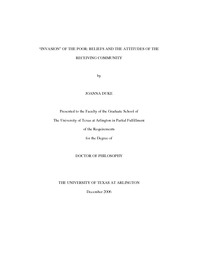
ATTENTION: The works hosted here are being migrated to a new repository that will consolidate resources, improve discoverability, and better show UTA's research impact on the global community. We will update authors as the migration progresses. Please see MavMatrix for more information.
Show simple item record
| dc.contributor.author | Duke, Joanna | en_US |
| dc.date.accessioned | 2007-08-23T01:56:03Z | |
| dc.date.available | 2007-08-23T01:56:03Z | |
| dc.date.issued | 2007-08-23T01:56:03Z | |
| dc.date.submitted | August 2006 | en_US |
| dc.identifier.other | DISS-1410 | en_US |
| dc.identifier.uri | http://hdl.handle.net/10106/100 | |
| dc.description.abstract | Housing policy as one of the tools for eradicating poverty remains a critical arena for debate, especially in light of the dire situation of impoverished inner cities and growing inequalities between communities in the U.S. Policies aimed towards ameliorating the negative effects of these inequalities on impecunious residents include deconcentrating poverty through the dispersion of public housing residents into more affluent neighborhoods. The logic behind this approach is the assumption that removing barriers and obstacles from low income families by integrating them into middle class neighborhoods will increase the life chances of the low income families. These policies are often met with resistance by the receiving community, perhaps impeded by the ideological debate of how involved the government should be in correcting inequalities when it infringes on the rights of other individuals.
This dissertation explores the ideological aspects of residential mobility policies from a multi-dimensional, theoretical framework of liberty and Lefebvre's "right to the city." Liberty is an assumed basic right of all Americans. Yet liberty is not perceived in the same way by everyone, and an application of the concepts of positive and negative liberty are explored as a basis for what the receiving community believes is an ideal form of liberty. A theoretical framework based on Lefebvre's concept "right to the city" analyzes the receiving community's perceptions of diversity in their community, the rights of the entering community compared to their own and their prioritizing of exchange and use values of the city (Lefebvre, Logan and Molotch 1987). This approach can provide new insights into the relocation of the poor, the current dominant policy strategy in the U.S. for ameliorating the harmful effects of concentrated poverty. To date, there has been no focus on the ideological basis for the receiving community's opposition and the effects that might have on policy outcomes. Data from a survey conducted in Southwest City and Dallas communities where mixed income developments have been located is analyzed to discover the effects these mixed income developments have on the receiving community's attitudes toward race, poverty, gender issues, mental illness, sense of community and ideal policy solutions. Results indicate that both ideology and attitudes provide insight on the homeowners' opposition to mobility programs. | en_US |
| dc.description.sponsorship | Barrett, Edith | en_US |
| dc.language.iso | EN | en_US |
| dc.publisher | Urban & Public Affairs | en_US |
| dc.title | "Invasion" Of The Poor: Beliefs And Attitudes Of The Receiving Community | en_US |
| dc.type | Ph.D. | en_US |
| dc.contributor.committeeChair | Barrett, Edith | en_US |
| dc.degree.department | Urban & Public Affairs | en_US |
| dc.degree.discipline | Urban & Public Affairs | en_US |
| dc.degree.grantor | University of Texas at Arlington | en_US |
| dc.degree.level | doctoral | en_US |
| dc.degree.name | Ph.D. | en_US |
| dc.identifier.externalLink | https://www.uta.edu/ra/real/editprofile.php?onlyview=1&pid=1121 | |
| dc.identifier.externalLinkDescription | Link to Research Profiles | |
Files in this item
- Name:
- umi-uta-1410.pdf
- Size:
- 508.8Kb
- Format:
- PDF
This item appears in the following Collection(s)
Show simple item record


